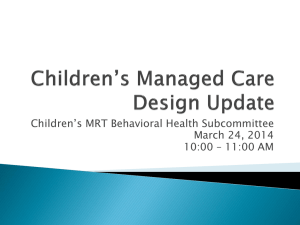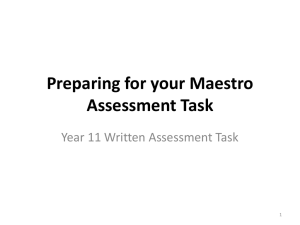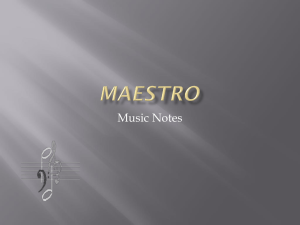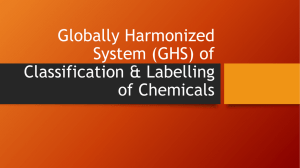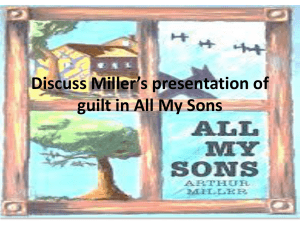Discussion Questions
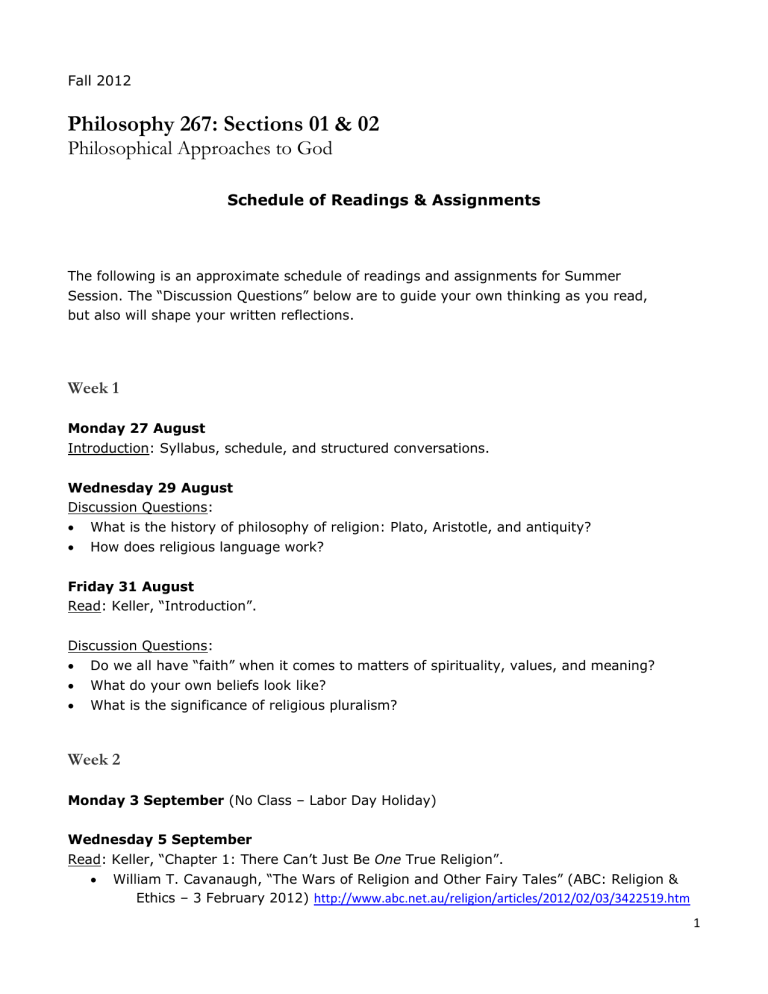
Fall 2012
Philosophy 267: Sections 01 & 02
Philosophical Approaches to God
Schedule of Readings & Assignments
The following is an approximate schedule of readings and assignments for Summer
Session. The “Discussion Questions” below are to guide your own thinking as you read, but also will shape your written reflections.
Week 1
Monday 27 August
Introduction: Syllabus, schedule, and structured conversations.
Wednesday 29 August
Discussion Questions:
What is the history of philosophy of religion: Plato, Aristotle, and antiquity?
How does religious language work?
Friday 31 August
Read: Keller, “Introduction”.
Discussion Questions:
Do we all have “faith” when it comes to matters of spirituality, values, and meaning?
What do your own beliefs look like?
What is the significance of religious pluralism?
Week 2
Monday 3 September (No Class – Labor Day Holiday)
Wednesday 5 September
Read: Keller, “Chapter 1: There Can’t Just Be One True Religion”.
William T. Cavanaugh, “The Wars of Religion and Other Fairy Tales” (ABC: Religion &
Ethics – 3 February 2012)
http://www.abc.net.au/religion/articles/2012/02/03/3422519.htm
1
Discussion Questions:
Do you think most people actually do rank religions qualitatively?
Do all religions share some common “core”?
Is it fair to ask that people keep their faith “private”, as a matter of personal belief?
Friday 7 September
First Reading Reflection due.
Read: Alvin Plantinga, “A Defense of Religious Exclusivism” (emailed document)
Zagzebski & Miller [Z&M] – John Hick, “Religious Pluralism & Salvation” (445-454)
Discussion Questions:
What does Plantinga mean by “exclusivism” when it comes to religious truth?
What does Hick mean by “pluralism” in matters of religion?
Do you think Plantinga provides an adequate response to Hick’s argument?
Week 3
Monday 10 September
Read: Zagzebski & Miller [Z&M – The Dalai Lama, “The Bodhgaya Interview” (455-458)]
[Z&M – Karl Rahner, “Christianity and the Non-Christian Religions” (459-464)]
Wednesday 12 September
Read: Keller, “Chapter 2 – How Could a Good God Allow Suffering?”
Discussion Questions:
Keller argues that just because we can’t find a good reason for God to allow suffering doesn’t mean that there isn’t one.
What do you think about this response? Is it just a cop-out to say that God’s ways of acting are necessarily beyond our comprehension?
Keller argues that religion (particularly Christianity) provides resources for facing pain with hope and courage.
Have you ever experienced this sort of hope or courage? How and in what circumstances?
Keller asks, “On what basis…does the atheist judge the natural world to be horribly wrong, unfair, and unjust?”
How would you respond to this question?
Friday 14 September
Read: Z&M – Plato, “God Is Not the Author of Evil” (323-324)
Z&M – Lactantius, “On the Anger of God” (325-326)
2
Discussion Questions:
How does Plato argue that God cannot be the cause of evil?
What is Epicurus’ argument against a good God, based upon the existence of evils, as recorded by Lactantius? How does Lactantius respond to Epicurus?
Week 4
Monday 17 September
Read: Z&M – Augustine, “That Which Is, Is Good” (327-328)
Z&M – Augustine, “On the Free Choice of the Will” (329-331)
Discussion Questions:
What does Augustine mean when he says that so long as anything exists, it is good and that if something was deprived of all goods, it would cease to exist altogether?
According to Augustine, what is the relationship between free will and wrongdoing?
To what evidence does Augustine point to show that free will, while it allows us to do wrong, is not for the purpose of doing wrong?
Wednesday 19 September
Second Reading Reflection due.
Read: Z&M – J.L. Mackie, “Evil and Omnipotence” (342-349)
Discussion Questions:
What is the contradiction that Mackie sees between existence of a good and all-powerful
God and the existence of evil? (This is the logical problem of evil.)
What are the fallacious solutions to the problem that Mackie discusses and what are his responses to these?
Friday 21 September
Read: Z&M – Alvin Plantinga, “The Free Will Defense” (350-368)
Z&M – William Rowe, “Friendly Atheism, Skeptical Theism, and the Problem of Evil”
(380-388)
Discussion Questions:
What is Plantinga’s criticism of Mackie? Do you think it succeeds?
What Rowe’s argument that kinds and quantity of evil in the world makes a good and allpower God unlikely? (This is the evidential problem of evil.)
3
Week 5
Monday 24 September
First Conversation – Topic: “Do Evil and Suffering Disprove God?”
Wednesday 26 September
Wrap up any loose ends on the problem of evil.
Friday 28 September
Third Reading Reflection due.
Read: Keller, “Chapter 3 – Christianity Is a Straightjacket”
Stanley Fish, “The Trouble with Tolerance” (emailed document)
Discussion Questions:
Keller argues that the values of Western democracy are a kind of secular absolute truth that lies beyond the possibility of complete certainty and proof.
Do you agree? Does that make these values similar to religious values and beliefs?
Fish’s essay is a review of Wendy Brown’s book Regulating Aversion, which examines the emergence of “tolerance” as a central political and social category.
What is the problem with “tolerance” that Fish identifies, based on Brown’s book, and why does he think Brown’s solution is inadequate?
Week 6
Mid-Term Exam: During next week and the week following, each of you will meet with me individually for your Mid-Term Exam (in the form of an oral interview).
Mid-term questions will be handed out in class this week.
Monday 1 October
Read: Keller, “Chapter 4 – The Church Is Responsible for So Much Injustice”
Discussion Questions:
Keller admits that non-religious people are often more moral than religious people, but suggests this might be, in part, because religion attracts people looking for help.
Does this make sense? Or would you say that if Christianity (or another faith) really does transform lives, then the behavior of its adherents should surpass that of non-adherents?
Wednesday 3 October
Read: Keller, “Chapter 5 - How Can a Loving God Send People to Hell?”
4
Discussion Questions:
In your experience, how have ideas of divine anger, punishment, and hell been portrayed?
What do you think of Keller’s argument that, if God genuinely loves his creation, then he must oppose anything that seeks to harm it?
Do you think that, if there is a God, it makes sense that he would be “big” enough to include not only mercy and love, but also judgment and wrath?
Keller defines hell as “one’s freely chosen identity apart from God on a trajectory into infinity”.
What do you think of that definition and the implications Keller draws from it?
Friday 5 October
Read: Keller, “Chapter 6 – Science Has Disproved Christianity”
Z&M – Daniel C. Dennett, “Atheism and Evolution” (614-623)
Discussion Questions:
Keller writes, “When evolution is turned into an all-encompassing theory explaining absolutely everything we believe, feel, and do as the product of natural selection, then we are not in the arena of science, but of philosophy”.
What do you think about this assertion? How would you respond to it?
What is Dennett’s argument for the conclusion that the explanatory success of evolutionary biology undermines believing in the existence of God?
Week 7
Monday 8 October
Fourth Reading Reflection due.
Read: Z&M – John F. Haught, “Darwin, Design, and Divine Providence” (624-635)
Discussion Questions:
How does Haught respond to Dennett’s argument (as well as arguments from proponents of “intelligent design” theories)?
Wednesday 10 October
Read: Z&M – Alvin Plantinga, “How Naturalism Implies Skepticism” (636-647)
Z&M – Timothy O’Connor “A House Divided…” (648-652)
Discussion Questions:
What is Plantinga’s argument for thinking that, if atheistic naturalism is true, then we have no good reasons to reject thoroughgoing skepticism?
How does O’Connor respond to Plantinga? Is his response convincing?
5
Friday 12 October
Read: Z&M – Thomas Aquinas, “Miracles” (565-566)
Z&M – David Hume, “Of Miracles” (567-571)
Discussion Questions:
How does Thomas Aquinas define a “miracle”? What do you think of that definition?
What are Hume’s reasons for thinking, that even if a miracle did occur, we could never be a good position to rationally believe it? How is eye-witness testimony unreliable?
Week 8
Monday 15 October (No Class – Mid-Semester Holidays)
Wednesday 17 October
Read: Z&M – George I. Mavrodes, “David Hume and the Probability of Miracles” (583-593)
Keller, “Chapter 6 – You Can’t Take the Bible Literally”
Discussion Questions:
What is Mavrodes’ response to Hume’s argument? Do you find his response effective?
Sometimes people reject sacred texts like the Bible because of how they portray God.
Keller responds, however, that this unreasonably “assumes that if there is a God he wouldn’t have any views that upset you” and why would we expect that?
Do you agree that we should expect a transcendent God to take stands and enforce rules that run counter to our sense of how things should be done? Why or why not?
Friday 19 October (No Class – I’ll be away at a conference)
Week 9
Monday 22 October
Second Conversation – Topic: “What Are Miracles and Might They Occur?” (or some other topic concerning science and faith).
Wednesday 24 October
Read: Keller, “Intermission”
Z&M – Justin Martyr, “How Justin Found Philosophy” (481-486)
Z&M – Thomas Aquinas, “Faith and Reason”
Discussion Questions:
What does Keller mean by “strong rationalism” and why does he see it as problematic?
6
What does he mean by “critical rationality”? How do arguments for the existence of God and/or the truth of Christianity fit into critical rationality?
What sort of “explanatory power” does Keller think theism might have?
What do you think about the relationship between faith and reason?
How does Justin describe his conversion? In what way is Christianity a “philosophy”?
How does Aquinas distinguish between faith and reason and what, according to him, is the relationship between the two? Can they ever conflict? How does reason support faith?
Friday 26 October
Fifth Reading Reflection due.
Read: Z&M – Blaise Pascal, “The Wager”
Z&M – Thomas V. Morris, “Pascalian Wagering”
Discussion Questions:
Why does Pascal think it’s worthwhile “betting” on the existence of God, even if there is no absolutely conclusive evidence for God’s existence?
What are the main criticisms of “Pascal’s wager” and how does Morris reply to them?
Week 10
Monday 29 October
Read: Z&M – W.K. Clifford, “The Ethics of Belief”
Z&M – William James, “The Will to Believe”
Discussion Questions:
Clifford famously argues that “it is wrong always, everywhere, and for any one, to believe anything upon insufficient evidence”.
What do you think of Clifford’s claim? Is it true? What does he mean by “evidence”?
How does James respond to Clifford? In what way is religious belief a living, forced, and momentous option for James? Why does he think it is worth risking faith?
Wednesday 31 October
Read: Keller, “Chapter 8 – The Clues of God”
Z&M – Aristotle, “The Eternality of Motion and the Unmoved Mover” (62-65)
Discussion Questions:
Among other arguments, Keller suggests that, in general, innate desires correspond to some sort of real objects that can fulfill them (hunger food; arousal sex).
He goes on to argue that the human longing for meaning, love, and beauty are strong indicators that God exists.
7
Do you agree that universal human desires point to God, or is there another explanation?
Friday 2 November
Read: Z&M – Al-Ghazali, “The Kalām Cosmological Argument” (66-67)
Z&M – Thomas Aquinas, “The First Three Ways” (71-72)
Z&M – Samuel Clarke, “The Argument from Dependent Beings” (73-75)
Z&M – David Hume, “Critique of the Cosmological Argument” (76-78)
Discussion Questions:
Aristotle, Al-Ghazali, Aquinas, and Clarke provide different versions of the same basic argument. What are their similarities and differences? Which do you think is strongest?
What are Hume’s main criticisms of these sorts of cosmological arguments? Do you think these objections are successful?
Week 11
Monday 5 November
Third Conversation – Topic: “Are There Good Arguments for God?” (this can focus upon cosmological arguments, teleological one, or arguments from beauty or other aspects of human experience)
Wednesday 7 November
Read: Z&M – Cicero, “The Design Argument” (25-26)
Z&M – Thomas Aquinas, “The Fifth Way” (27)
Discussion Questions:
Cicero (quoting the Stoic philosopher Quintus Lucilius Balbus) and Aquinas both provide very brief arguments for God from the appearance of design and purpose.
What do you think of their arguments?
Friday 9 November
Read: Z&M – William Paley, “The Watch and the Watchmaker” (28-30)
Z&M – David Hume, “Critique of the Design Argument” (31-38)
Z&M – Robin Collins, “The Teleological Argument” (39-50)
Discussion Questions:
Paley provides a more detailed sort of design argument for the existence of God. Do you think it is an improvement over those of Cicero and Aquinas?
What are Hume’s main lines of critique against design arguments for the existence of God?
Do you think that Collins’s argument avoids Hume’s criticisms? Do you find it persuasive?
8
Week 12
Monday 12 November
Sixth Reading Reflection due.
Read: Z&M – Rudolf Otto, “The Numinous” (119-122)
Z&M – Ludwig Feuerbach, “The Essence of Religion in General” (183-186)
Z&M – Sigmund Freud, “The Future of an Illusion” (187-190)
Z&M – Søren Kierkegaard, “Truth Is Subjectivity” (153-156)
Discussion Questions:
How might Otto’s discussion of the “numinous” intersect with what Keller says about beauty?
Feuerbach and Freud both see belief in God as a projection and fulfillment of human beliefs, needs, and desires.
How might their views serve as a response to what Keller says about innate desires corresponding to real objects?
What does Kierkegaard mean when he says in order for faith to be faith it must hold onto belief with passion even though the content of faith is objectively uncertain?
What do you think of Kierkegaard’s argument?
Wednesday 14 November
Read: Keller, “Chapter 9 – The Knowledge of God”
Z&M – Immanuel Kant, “The Moral Argument for the Existence of God” (272-275)
Discussion Questions:
Keller suggests our sense of right and wrong already makes us suspect God exists.
He argues, “We can’t know that nature is broken in some way unless there is some supernatural standard of normalcy apart from nature by which we can judge right and wrong.”
Do you agree that a shared sense of right and wrong is an indication of God’s existence?
Kant rejects cosmological and design arguments for the existence of God, but he provides his own argument from the nature of morality.
What is Kant’s argument for God from the nature of moral good as aimed at both morality and happiness? Is it a strong argument?
Friday 16 November
Read: Z&M – Plato, “The Euthyphro Dilemma” (279-282)
Discussion Questions:
The dilemma that Plato presents has to do with the nature of piety or holiness: “Is the holy holy because the gods approve it, or do they approve it because it is holy?”
9
How does this dilemma translate into a difficulty for the relationship between God and morality? Why is either option problematic for tradition versions of theism?
Week 13
Monday 19 November
Fourth Conversation – Topic: “Does Morality Need God?”
Wednesday 21 & Friday 23 November (No Class – Thanksgiving Holidays)
Week 14
Monday 26 November
Read: Z&M – Robert M. Adams, “Divine Commands” (288-298)
Louise M. Antony, “Good Minus God” (The New York Times December 18, 2011)
http://opinionator.blogs.nytimes.com/2011/12/18/good-minus-god/
Discussion Questions:
Adams provides a version of what is called “Divine Command Theory”, which grounds moral obligation in God’s commands.
What is Adams’s argument for the conclusion that divine commands make the best sense of our notion of a moral obligation?
Antony argues that the existence of God is not required for morality and that what is good would still be good whether or not God exists.
How is Antony’s argument a version of Plato’s Euthryphro dilemma? Do you think her argument functions as an effective response to Adams?
Wednesday 28 November
Paper Proposal & Outline Due (see Final Essay assignment for more detail)
Read: Z&M – Linda Zagzebski, “The Virtues of God and the Foundations of Ethics” (299-310)
Ross Douthat, “What Has Jerusalem to Do with Athens?” (The New York Times, May 22,
2012)
http://douthat.blogs.nytimes.com/2012/05/22/what-has-jerusalem-to-do-with-athens/
Discussion Questions:
Zagzebski offers an alternative way of thinking about the relationship between God and morality, more within the tradition of natural law theory and virtue ethics.
Do you think that Zagzebski’s approach provides a good reason for thinking that God’s existence is necessary for morality? Do you think it escapes Antony’s criticisms?
Douthat argues that liberalism needs the metaphysical underpinnings for ethics that theism provides. What do you think of his argument? Does he resolve the Euthyphro dilemma?
10
Friday 30 November
Read: Keller, “Chapter 10 – The Problem of Sin”
Keller, “Chapter 11 – Religion and the Gospel”
Jefferson Bethke, “Why I Hate Religion, But Love Jesus” (YouTube video, posted
January 10, 2012)
http://www.youtube.com/watch?v=1IAhDGYlpqY
Discussion Questions:
Keller says, “It is hard to avoid the conclusion that there is something fundamentally wrong with the world”.
What do you think he means by this? Do you think it’s valid to define what is broken in the world as sin? Why or why not?
What do you think of the distinction that Keller makes between “religion” and the Christian gospel?
How does Bethke’s video intersect with the kinds of claims that Keller makes in Chapter
11? Do you think Bethke and Keller are saying basically the same thing?
Week 15
Monday 3 December
Read: Alastair Roberts, “The ‘Atheistic’ Character of Christianity and the Question of Christ”
(emailed document)
Discussion Questions:
Roberts presents a similar point to those made by Bethke and Keller, but coming at it from a different angle. How is Roberts’s message similar to and distinct from that of the others?
Wednesday 5 December
Read: Keller, “Chapter 12 – The (True) Story of the Cross”
Discussion Questions:
Sometimes God, as presented in Christianity, sounds like a vengeful, primitive deity who demands appeasement. Shouldn’t he just accept people without Jesus’ sacrifice?
Keller responds by an analogy with human forgiveness, where one person, in order to forgive, must absorb the cost of another person’s wrongdoing – even if it hurts.
What do you think about Keller comparing the pain of human forgiveness to God’s act of sacrificing his Son to redeem humanity?
Friday 7 December
Read: Keller, “Chapter 13 – The Reality of the Resurrection”
N.T. Wright, “Jesus’ Resurrection and Christian Origins” (From Gregorianum 2002 83/4:
11
615–635)
http://www.ntwrightpage.com/Wright_Jesus_Resurrection.htm
Discussion Questions:
Keller argues for the historical truth of Jesus’ resurrection, an argument that is based upon
Wright’s analysis of the biblical and historical data.
What do you think about this sort of evidential argument? Is it a historical argument? Is it logically sound? What are the philosophical implications?
Week 16
Monday 10 December
Read: Keller, “Chapter 14 – The Dance of God”
Discussion Questions:
Keller concludes by arguing that “Christianity makes the most sense out of our individual life stories and out of what we see in the world’s history” – a kind of argument “by inference to the best explanation”.
Do you think Keller has made a compelling case? Why or why not?
Wednesday 12 December
Final Papers Due: You can drop off papers at my office (Wister 225; there will be a box outside my door) any time until 12 December, so long as I get them no later than 3pm on
Wednesday.
12

